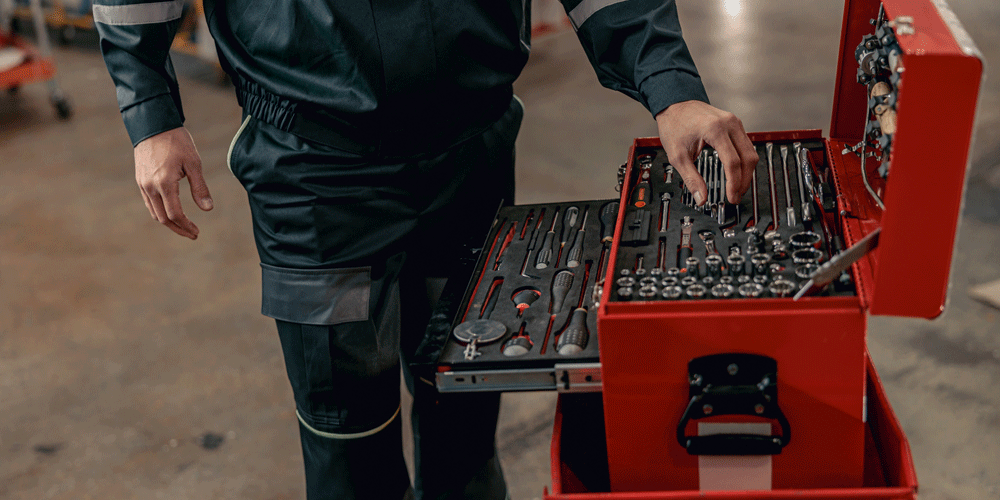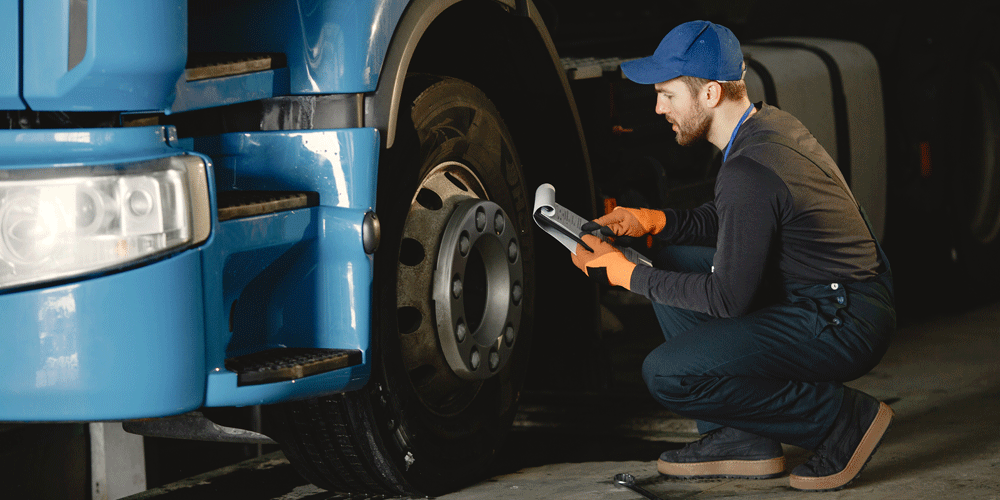
Are you passionate about all things diesel engines? Do you thrive in hands-on environments where every day brings new challenges to solve? If so, you're likely considering a career as a diesel mechanic — a role that demands not only technical expertise but also strong problem-solving skills and a knack for teamwork.
As you start your search for a diesel mechanic position or training program, you’re probably also thinking about the interview process. If you’re an experienced mechanic, you might be worried about how to perfectly showcase your technical skills. If you’re pursuing an apprenticeship program, you might be worrying that your resume doesn’t capture your potential.
In this comprehensive guide, we'll walk you through everything you need to know to ace your diesel mechanic interview. From preparing your resume to asking the right questions, we've got you covered here at Anderson Trucking Service (ATS).
We not only regularly hire diesel mechanics for our shops, but we also have a diesel mechanic apprenticeship program, so we’ll help you understand exactly what employers are looking for when they hire.
Whether you're a seasoned mechanic looking for a new opportunity, a recent graduate eager to jumpstart your career, or someone with an interest in a diesel mechanic training program, this article will equip you with the tools and confidence you need to succeed in the competitive world of diesel mechanics.
With our expert tips and practical advice, you'll be well on your way to landing that coveted role and embarking on a rewarding career in diesel mechanics.
Tip #1: Prepare Your Resume
If you’re planning to be a diesel mechanic, you may or may not have already completed the training for it. The beauty of being a diesel mechanic is that you can get on-the-job training. With no experience, you can get hired for a diesel mechanic apprenticeship where you learn the tricks of the trade.
Regardless of whether you have diesel mechanic experience or not, make sure you update your resume before you go into an interview. Keep it up-to-date by highlighting relevant experience, certifications, and skills related to diesel mechanics. Even if you don’t have any diesel mechanic training, you can still show transferable skills on your resume. For instance, if you spent time in high school shop classes or you worked in another trade where you had to do tooling or repair work, put it on your resume.
A willingness to learn, ask questions, and show up on time is crucial. ATS and similar shops can train just about anyone as long as the candidate is willing to learn and ask questions. Chances are, your interviewer will be looking for these skills in you.
Check out these tips for writing a great resume.

Tip #2: Research the Company
You should always research the company before you go into an interview. Check out their website, social media accounts, and Google reviews to learn more about them, including what industries they serve, the equipment they work on, their values, their history, and so on.
When you go into an interview armed with this information, it shows your interest in the company and preparation.
Your research will also help you determine if you actually want to work there. If you see something you don’t like when you’re reviewing their website or checking out their reviews, you may decide you don’t want to go any further in the interview process. Maybe your values don’t align, you don’t like working on the equipment they work with, and so on.
While you’re researching, don’t forget to review the job description and requirements again. Be prepared to discuss how your skills and experience align with what the company is looking for. This is especially important if you don’t have previous diesel mechanic training and experience.
If relevant, review key concepts and skills related to diesel mechanics, such as engine diagnostics, repairs, maintenance procedures, and safety protocols.
Tip #3: Do a Mock Interview
It’s always a good idea to sit down before an interview and practice your interviewing skills. Sit down with someone you trust and practice talking about specific examples of projects or challenges you've encountered in your previous roles and how you successfully resolved them.
Be ready to discuss your skills and highlight any relevant certifications or specialized training.
Mock interviews are not only great because they allow you to think about your experience and apply it to the position you’re interviewing for, but they can improve your confidence.
Tip #4: Prepare Interview Questions
Not only should you prepare answers for common interview questions related to your experience, technical skills, problem-solving abilities, and teamwork, but you should also be ready to ask good questions.
It’ll demonstrate your interest in the position, sure, but it’ll also help you decipher which company is right for you if you’re interviewing with multiple companies.
When interviewing for a diesel mechanic apprenticeship position, be sure to ask the following:
- How long is the apprenticeship program? Some apprenticeship programs last longer than others. A good program should last at least a year. Typically, the longer the program the better the success rate. Some programs are brief; the company is simply trying to get people in and out of the program quickly. This may mean the program isn’t very thorough. As a result, you may not feel adequately trained.
- What is the success rate of the apprenticeship program? The success rate of the apprenticeship program may help you decide if it’s right for you. If no one is succeeding and staying on with the company, it might not be a great program.
- What does the training program look like? Find out if the training program is totally hands-on, computer-based, or a mixture of both. You may learn better one way over the other, so it’s important to understand how you’ll be trained.
- Are there advancement opportunities? Find out if you can advance in your role, or if you’ll be stuck changing tires and oil forever. If you deserve to move up and do diagnostic work, you don’t want to be stuck at a company without a clear career path.
- What support resources will I have? Whether you’re pursuing an apprenticeship or you’re a seasoned diesel mechanic, it’s a good idea to know if there’s a team in the shop to support you. After all, you’ll need to learn the ropes of a new company. If you’re going to be an apprentice, learn how many people will be trained at once and if you’ll get the time and attention you need.
- Is there a tool program? Tools typically cost between $3,000 and $5,000 if you’re just getting started. Some companies will offer a stipend for this to help you start building your toolbox. This can be a huge benefit.
- What is the pay structure? There are two primary ways you can get paid as a diesel mechanic: Hourly and flat-rate. You could also get incentive pay on top of that. The way you get paid can have a major influence on which company you decide to work for.
- What are the benefits? It’s always a good idea to ask about the benefits offered. Do they have health insurance? Retirement accounts? You want to work for a company that can meet your needs.
Asking these questions — especially if you’re interviewing with multiple shops — will help you get a good idea of how well you’ll like their program and if you’ll find success.

Tip #5: Dress Appropriately
Choose professional attire that reflects the culture of the company. Even though you might be working in a hands-on environment, dressing professionally shows respect for the interview process.
Do you need to wear a suit and tie or a ball gown? Definitely not. In fact, this is one position where overdressing could potentially do more harm than good.
It’s a good idea to keep your appearance neat. A clean pair of jeans with a button-down shirt or a polo is just fine.
Tip #6: Arrive Early
Plan to arrive early for the interview to allow time for any unexpected delays. Greet the interviewer with a firm handshake, maintain eye contact, and be polite throughout the conversation.
Pursue the ATS Apprenticeship Program
Preparing for a diesel mechanic interview requires a thoughtful blend of practical preparation, technical knowledge, and personal presentation. Whether you're a seasoned professional, a recent graduate, or an individual interested in an apprenticeship, the tips above will set you up for success.
By updating your resume, researching the company, practicing through mock interviews, preparing insightful questions, dressing appropriately, and arriving early, you position yourself as a strong candidate.
Remember, the key to success as a diesel mechanic lies in your ability to communicate, learn, and grow. With the expert tips above, you’re well-equipped to navigate the interview process and embark on a rewarding journey in the diesel mechanics industry.
If you’re looking for a great apprenticeship program, look no further than ATS. We have a team of experts dedicated to your success in the program and we have the success rates to show it. The program lasts at least a year, and you’ll get a mix of some computer training and hands-on training to help you succeed and become well-equipped to move up the ranks as a diesel mechanic.
Check out our list of openings and apply today!



